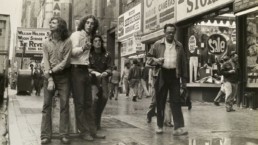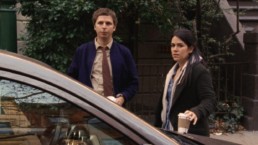Composer Keegan DeWitt on Seeking the 'Sad Little Happiness'
While he may not be as recognizable a household name as the filmmakers he collaborates with, I can almost certainly guarantee that you've heard Keegan DeWitt's work before.
A staple in the independent film world, his musical talents have been featured in the films "Hunter Gatherer," "Land Ho!," "Listen Up Philip" and many, many more. Most recently, DeWitt had four projects premiere at the 2017 Sundance Film Festival, making him one of indie cinema's most in-demand musical composers.
It must have been quite a surreal experience, and major validation as an artist, to have “Newness,” “The Incredible Jessica James,” “Golden Exits,” and “The Hero” screen at the festival. How difficult was it for you to juggle each of the film’s distinctive styles while in production?
It was definitely a bit hectic, but in many ways, it can be refreshing. It’s always nice to be able to jump from one world to another. If you’re running out of gas on one thing, or no inspired ideas are hitting, you can sort of pivot and try and jump into something else. It’s obviously not always that simple, but I enjoy the challenge of it.
How important is a composer’s job in relation to the film as a whole
I think it always depends, but obviously, it can be a very large part. The joy of composing– if you approach it as a filmmaker more than just a musician– is that you get to speak the unsaid and sort of be the air in the room. You get to hint at the intangible that is just slightly hidden. That sort of poetic beauty is what drove me to fall in love with composing. Walker Percy once referred to the idea of the “sad little happiness” and I always felt like that term pinned perfectly what I aim for as a composer. That quiet spark somewhere just beneath the surface. It’s something Chekov mastered in many ways… there is an entire tectonic emotional world just beneath the surface, and often, the music can be the voice to that.
Has music always been a fascination to you?
As I grew up, music was almost like my way of journaling. I grew up in Portland, OR and was obviously inspired by Elliot Smith, who was very active there at the time. His entire aesthetic sorta taught me about the world of 4-track cassette recording. I would sit up in my room all night long and just layer track on top of track, building these little sketches. Sort of like how someone else might draw or keep a diary, I was doing that with music.
My real driving desire growing up was to make films, so music was always a sub-current to that; I was sort of a lover of films and plays first. When those two worlds melded, it became something interesting because it made it so that I approached film composing almost as though I was a filmmaker. It was easy to put aside my musical conceits and dig towards what was behind an actor’s eyes or what was playing in the light that a cinematographer had so elegantly placed in the frame.
Walker Percy once referred to the idea of the “sad little happiness” and I always felt like that term pinned perfectly what I aim for as a composer.
[soundcloud url="https://api.soundcloud.com/users/3175497" params="auto_play=false&hide_related=false&show_comments=true&show_user=true&show_reposts=false&visual=true" width="100%" height="450" iframe="true" /]
Musically, one of the most distinctive moments for me was the opening scene of “The Incredible Jessica James,” when Jessica Williams dances throughout the film’s opening credits and ends up on the roof of her NYC apartment. What was your inspiration going into the composition of that scene?
That was something from the very early stages that I knew Jim wanted to do. We had talked general overall sound stuff, and it all sorta branches out from there… this feeling of the Daptones meets Mark Ronson meets breakbeat vinyl cuts meets something else… I did a ton of processing on everything to really make it feel like a live vibrant take printed to vinyl.
Any unique tricks or techniques you used in the films?
Well, I definitely processed it much more like it was a pop recording versus a score. With a score, you almost never process the final stereo signal, but I was constantly shoving entire mixes through cassette tape players and old compressors and finding different ways to distort and age stuff. We wanted everything to feel like it could be a real album cut that we synced off of vinyl.
Like good editing, the best jobs often go unnoticed. It’s subtle, yet makes a huge impact on a film’s overall reception. Is this something you acknowledge in your work?
I think it varies based on the film obviously. Like you said, this film begins with a pretty big musical moment. It’s actually similar in some ways to another film I did, “Morris From America,” where if I’m doing my job right, you almost don’t realize it’s custom score, you think it’s a sync source track. With both “Morris” and this film, we almost wanted to trick people into thinking it had the best soundtrack ever, even though it was score made custom for this film.
...I approached film composing almost as though I was a filmmaker.
That said, do you ever feel like your work goes unrewarded at times?
No, I very rarely feel that way. If anything, you sometimes feel like you wish you could have pushed it to be edgier or more experimental, or perhaps there was a cue you did that you really fell in love with that didn’t make the cut. It’s more that than anything. There have been a few projects where I’ll come up with a bunch of ideas and then it [ultimately] ends up sounding like a safer version of things. Not always bad, though. Sometimes the director is very right, simpler is better.
Where do you feel like you do your best work; your most inspiring environment?
Sometimes it’s a new instrument. You sit down, play a couple notes and you know… there is an entire film score in there. Sometimes it’s the excitement of a new collaborator. Working with Alex Ross Perry for the first time on “Listen Up Philip,” I was just really thrilled to be teaming up with him and Jason Schwartzman and that alone really carried a lot of the weight.
Who are a couple of your favorite artists, past and present?
Separate from the film world, I love WARPAINT and Little Dragon. I listen to them more than most other things just to clear out my brain and ears.
As well as successfully working as a film composer, which has garnered an Academy Award among other prestigious titles, I hear you’re also a Portland Trail Blazers fan. What other passions do you have aside from music?
Every July my world pretty much shuts down because of the Tour de France, I’m avid cycling fan as well.
'As You Are' Review: An Edgy Look at Youth, Angst, and Sexuality
The structure of the film centers around a real-time investigation with flashbacks driving the story, much like the first season of "True Detective."
Before Charlie Heaton shot to stardom playing the gawky teen Jonathan Byers in the television phenomenon "Stranger Things," he was a fresh-faced actor starring in the indie film "As You Are," alongside television veteran Owen Campbell ("The Americans," "Boardwalk Empire") and teenage icon Amandla Stenberg ("The Hunger Games"). Hesitant to be labeled just another "coming of age" film, director Miles Joris-Peyrafitte creates an edgier, darker look at growing up and navigating through the confusing nuances of life, which don't always result in a happy ending.
Not only was "As You Are" accepted into the 2016 Sundance Film Festival, it was also awarded the U.S. Dramatic Jury prize.
"As You Are" is not rated. 110 minutes. Playing at the Village East Cinema, NYC on 2/24/17 with additional cities to follow.
'Every 40 Years' Discovers a Father's Rock Star Past [WATCH]
A balanced blend of thoughtfulness and boogie, "Every 40 Years" is as humble a film as the band members themselves.
Many people cringe at the thought of their parents’ wild and crazy antics as young adults, during the years of pre-children responsibility, but director Eric Goldrich was so infatuated with his dad's unknown past life, a man whose title, as far as he was concerned, was only that of "father," that he set out to investigate his family's history. What he discovered about the identity of his unassuming dad turned out to be a giant surprise in the form of an underground rock-n-roll icon of the 1970s. This is the premise of the documentary "Every 40 Years"– an enjoyable journey of discovery and second chances.
Goldrich, along with co-director Ben Friedberg, takes audiences down memory lane as he explores his dad's involvement in the band Gunhill Road, 40 years after the group broke into the Billboard Top 40 charts. His father, Steve Goldrich, (Piano/Vocals) and his bandmates, Glenn Leopold (Guitar/Vocals), Gil Roman (Original Bass/Vocals) and Paul Reisch (Bass/Vocals), recount their days as an up and coming band, playing shows at the legendary venue, The Bitter End, in New York City.
While they seemed to have a promising career after the release of their first and second record (the latter which Kenny Rogers produced), shady deals and other external factors caused the group to go their separate ways. Intimate interviews capture the heartache felt by the members at that time– even 40 years later, the raw emotions are still there. However, when an opportunity arises to reunite for one final show, the former bandmates jump at the chance, much to the delight of their fans and the guys themselves.
The title is a bit misleading to me, for some reason the phrase "Every 40 Years" conjures up feelings of heaviness and dramatic longing. But after watching this film, one thing's for sure, if these guys weren't musicians, they would have made a killing as stand-up comics. Aside from being funny, it is obvious that those who are fans of Gunhill Road will get a kick out of seeing them back in the spotlight. Whether or not you're a Gunhill Road fan, the universal theme of passionate living and believing in second chances will no doubt resonate with audiences.
Talking with Dev Patel, Janelle Monáe, and the Rest of the 2017 Virtuosos Award Recipients [WATCH]
One of our favorite nights of the Santa Barbara International Film Festival is the presentation of the Virtuosos Award, which recognizes a select group of talent who have distinguished themselves by breakthrough performances in film this past year.
On the red carpet, we chat with the eight award recipients, who include Oscar-nominees and some of Hollywood's biggest and brightest stars. This year, we celebrate Aaron Taylor-Johnson (Nocturnal Animals), Dev Patel (Lion), Janelle Monáe (Hidden Figures, Moonlight), Mahershala Ali (Moonlight), Naomie Harris (Moonlight), Ruth Negga (Loving), Simon Helberg (Florence Foster Jenkins), and Stephen McKinley Henderson (Fences). An amazing line up of stellar performances indeed!
‘Lion' Review: A Destiny is Discovered In This Heartwarming Film
LION (2017)
Starring Dev Patel, Nicole Kidman, Rooney Mara
Directed by Garth Davis
Distributed by The Weinstein Company. 118 minutes. Rated PG-13
As its name implies, Lion is a dramatic and extraordinarily powerful film, now having been nominated for six Academy Awards. Directed by Garth Davis, Lion tells the incredible true story of five-year-old Saroo (Sunny Pawar) who, after being accidentally separated from his family in one of the world's busiest cities, Kolkata, India, ends up over 1,000 miles away from where he is later adopted by a loving couple in Australia. Two decades later and without even a last name to base his search on, his adulthood quest to discover his identity fuels an emotionally urgent and spiritual search for his true home.
Based on the story A Long Way Home by Saroo Brierley, the film immediately tugs at our heartstrings by introducing us to young Saroo, played by newcomer Sunny Pawar, whose innocence and curiosity of the world bursts out of his large doe eyes and small frame. After falling asleep on a moving train and traveling for an undocumented amount of time and distance, Saroo becomes a little boy lost in translation and environment who must survive in the threatening adult world amidst his confusion and isolation.
Saroo's fate is changed when he falls into the care of an orphanage and is quickly adopted by Sue (Nicole Kidman) and John Brierley (David Wenham). Years pass and Saroo, now in his late twenties (Dev Patel), is fully settled into life in Australia, taking college courses and in a steady relationship with Lucy (Rooney Mara). One night, sparked by a sudden and vivid flashback, Saroo decides that, with the help of Google Earth and only a handful of memories, he is ready to give all he has to find his childhood home and birth mother, some twenty-five years later.
Dev Patel's Best Supporting Actor nomination is fully deserved in this role, as he brings the emotional crossroads that Saroo faces to life in an extraordinarily measured performance. The complex emotions he balances of desperately wanting to find his birth family without wanting to hurt the feelings of his adoptive parents' tip over when he can no longer hide his longing for answers to the life he once lived. Patel's portrayal of battling this personally felt and complex family dynamic is resilient, industrious, and confident – his story is a true hero's journey.
The world from five-year-old Saroo's perspective is a big, scary place, and cinematographer Greig Fraser knows how to portray the feeling of being a small person in a big, overwhelming world, and in a very intimate way. Fraser, who had been working on Rogue One: A Star Wars Story simultaneous to Lion, uses his experience in the Star Wars universe to epically convey the feeling of a (no pun intended) "force" bigger than oneself. In the first half of the film, five-year-old Saroo is physically lost among the colorful and crowded streets of India. Yet in the second half, a now older Saroo is emotionally lost, facing an identity-less and hopeless future that becomes the bleaker part of the film. In both instances, we feel the fevered and urgent energy pulsing from Saroo and the environments themselves, leading to a gripping climax and heart-filling ending.
Lion has all of the things that make up a great film: a phenomenal cast coupled with an impactful true story that leaves one with an optimistic outlook on life. While it’s emotional yearning can play a bit heavy-handed at times, Lion is an electrifying journey that creates a vast emotional scope on screen and undoubtedly, an abundance of tears that will be hard to hide from your neighbor. Yes, I admit, I'm speaking from experience.
"Lion" is rated PG-13 for thematic material and some sensuality. 118 minutes. Now playing in theaters.
Drake Doremus, Matthew Gray Gubler talk 'Newness' [WATCH]
The day we landed in Park City, Ryan and I had only a few hours to get from the airport, to our accommodations in Deer Valley, to the Eccles Center, where we were set to interview the cast and crew of "Newness," just minutes before the film's World Premiere at the Sundance Film Festival.
What started as a hectic day quickly turned into one of the most fun conversations I've had as I chatted with director Drake Doremus, Matthew Gray Gubler, Laia Costa, and screenwriter Ben York Jones. They shared in our excitement about what lay ahead that night and also the memory of Anton Yelchin (Doremus), our previous interview history (Gubler), filmmaking similarities of past films (Costa), and our common Alma Mater, Chapman University (Jones).
'Person to Person' Review: Dry Humor Fuels This Eccentric Ensemble Comedy
This year, Defa returned to Sundance to have his second directorial feature film, the simple yet simmering ensemble comedy – also titled "Person to Person" – once again embraced by audiences for its sophisticated story of smart hearts and wits between an eclectic bunch of New York City-dwellers.
When Salt Lake City native Dustin Guy Defa brought his short film "Person to Person" to the Sundance Film Festival back in 2014, it was nominated for a Grand Jury Prize in its category. This year, Defa returned to Sundance to have his second directorial feature film, the simple yet simmering ensemble comedy – also titled "Person to Person" – once again embraced by audiences for its sophisticated story of smart hearts and wits between an eclectic bunch of New York City-dwellers. Playing in the Next category of the festival, "Person to Person" (the feature) is series of inter-cut stories involving a mostly pair of persons in which subtly eccentric characters deliver hilariously dry deadpan-on-arrival humor about any of the mundane things that occur in daily life, revealing an insightful take on modern day human connections.
Standing apart from its more dynamic and showy festival-playing peers, this observational comedy is a gentle slice of life flick which follows various characters. And though its storylines do not intersect or have any connection to each other, together they amplify the normally mundane lives lived by today's young adults. Over the period of 24 hours, we are introduced to a collection of odd ducks, including Bene (Bene Coopersmith), a vinyl collector seeking revenge on the dumb deadbeat who sold him a fake record; Ray (George Sample III), who is facing the repercussions of posting nude pictures of his ex-girlfriend on the internet; angsty feminist teen Wendy (Tavi Gevinson), who suffers through the politics of high school, dating, and life itself; and Phil (Michael Cera), a reporter at a daily newspaper who takes it upon himself to train the company's new hire Claire (Abbi Jacobson) in investigating a hot lead and her first story – the (alleged) murder of a wife's (Michaela Watkins) husband.
Standing apart from its more dynamic and showy festival-playing peers, this observational comedy is a gentle slice of life flick which follows various characters.
This mashup-movie of comedic forces delivers not only a wholly funny and complete film but in the characters' wistful performances, also oozes an overall nostalgia itself. Shot on 16mm film, the old-school look is a warm and self-deprecating nod to the simpler days of yester-year's troubles, like the love child of Woody Allen and Charlie Brown. Defa constructs these surface-complicated personal relationships with a sense of uplift that conveys the struggle for connection as the thematic thread that ties the film's characters together.
Music also plays a large role as the thematic guideline to the characters feelings. Offbeat jazz tempos accompany a frantic Bene, who is as impulsively scattered as the music itself. Heavy metal – particularly of the headache-inducing variety – becomes another quirk of Cera’s Phil (a crucial dimension to his character as he addresses the music at face value when he finally gets Claire to join him in a head-banging session). This scene is perhaps the funniest in the film, largely due to Jacobson's ability to humor Cera, all the while remaining skeptical of his shenanigans.
"Person to Person" is a wonderfully compartmentalized comedy, whose story about the minutiae of everyday life will take a restrained yet worth it view to appreciate. Those looking for the immediate laughs that might more easily jump off the screen may grow tired of the film's tonal pacing and cadence, but its lovely brand of intelligentsia comedy will certainly find devoted audiences past its festival circuit.
'The Incredible Jessica James' Review: Jessica Williams' Star Burns Bright
"The Incredible Jessica James" is quite – dare I say it, incredible – for a number of reasons, an obvious one being that a strong and independent woman of color takes the helm, quirks and all, and we love her for it.
The closing-night film of the Sundance Film Festival has the pressure of being the last thing that audiences will remember after ten days of non-stop movie-hopping. And while that pressure may be too intense for some, the joyously crowd-pleasing "The Incredible Jessica James" is a film that's more than game to take on that challenge and honor. Writer/director Jim Strouse's ('People, Places, Things') comedy-vehicle stars Jessica Williams as a young aspiring New York City playwright struggling to let go of the past and embrace the uncertainty of her future (and all while dancing her way through it) is exactly the type of light-fared yet empowering film that will delight all who see it.
Opening with a hilariously on-point awkward Tinder date, Jessica James (Williams) shakes it off in the film's following title sequence, oozing charisma and spirit as she marches –but in this case, dances– to the beat of her own drum. Her upbeat energy gets her through receiving rejection letters for her original playwriting from every major theater company and carries over to her job as a non-profit theater teacher, educating and inspiring youths in Hell's Kitchen (which barely pays the bills of her "deep, deep, deep Bushwick apartment"). All this, while trying to regroup after a breakup with an ex (Lakeith Stanfield) which leads to a date set up by her pal (Noël Wells) with the recently-divorced app designer Boone (Chris O'Dowd). A connection sets in, forcing each other to navigate a confusing new world where their exes loom large in memory and professional frustrations set in.
A woman of color standing at six feet tall, Jessica Williams is a commanding on-screen presence displaying confidence to the bone with her "woke" millennial attitudes and values about gender, race, and cultural identity issues that sing and soar with her cool-chick attitude and vibe.
A woman of color standing at six feet tall, Jessica Williams is a commanding on-screen presence displaying confidence to the bone with her "woke" millennial attitudes and values about gender, race, and cultural identity issues that sing and soar with her cool-chick attitude and vibe. A former correspondent on the Jon Stewart-era "The Daily Show," she cut her teeth delivering comedic lines, which here, draw non-stop laughs from the audience throughout the film. Williams, who might draw a pop-culture comparison as the next Lena Dunham (but don't compare the two) for being a young actress and activist who doesn't only check all the boxes of what American independent film needs right now, but creates them.
Funnyman Chris O'Dowd plays a great comedic partner, whose sincerity and comedic sensibilities perfectly match Williams' (in height as well). As a fool in love who doesn't hide the messy reality of emotions that getting over an ex-lover entails, some of the film's strongest moments come from the honesty of modern-day dating rituals like Instagram stalking, "booty calls," and relationship labeling. As strong as these themes and central characters are, the supporting characters in Wells and Stanfield also add to the film's charming strengths.
"The Incredible Jessica James" is quite – dare I say it, incredible – for a number of reasons, an obvious one being that a strong and independent woman of color takes the helm, quirks and all, and we love her for it. It's a breakout role for Williams, who will no doubt find herself catapulting to bigger success. Since premiering at the festival, Netflix has acquired worldwide distribution rights to the film for just over a reportedly $3 million dollars and will start streaming as a Netflix Original later this year.









